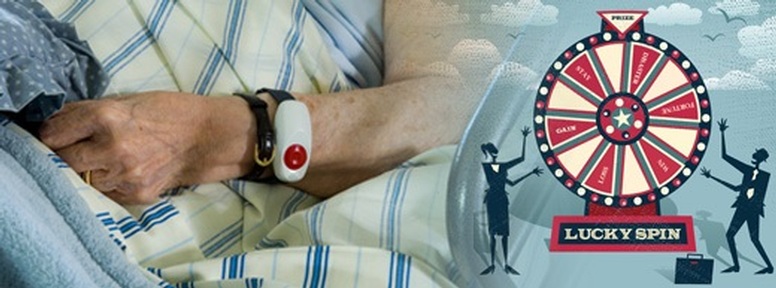Are we dying well? Many believe it’s still an end-of-life care lottery

Death and taxes, there’s nothing more certain. Yet, hospitals and social care providers are still grappling with how best to handle life’s great full stop.
For the sick and old, the end could be envisaged and prepared for a little better, say a plethora of reports on end of life care out this year. 2016 saw the Care Quality Commission’s report ‘A Different Ending: End-of-Life Care’ tell us ‘Overall, the quality of end-of-life care is variable with older people and people with non-cancer diagnoses being 'overlooked.’ A failure to meet the dying’s wishes, poor communication and bad planning, inconsistent access to pain relief and a lack of 24/7 care are major end-of-life complaints.
In July, Health Secretary Jeremy Hunt pledged to stop by 2020 the end-of-life lottery for the dying. He promised ‘honest’ discussions between clinicians and dying people, the chance for people to make informed care choices and a main 24/7 contact for dying people and their families.
A more palatable death
When you’re dying, you are more likely to want a more to be homeward bound or in a hospice, but too many are given the 'hospital runaround’ by clinicians that don't meet their wishes.
Every year many care providers voluntarily jump through hoops trying to meet a strict set of end-of-life care standards laid down by the training provider Gold Standards Framework (GSF) which assesses and can give skilled providers the equivalent of an A grade in end-of-life care. Keri Thomas, clinical director of the GSF centre, says: “More people want to die at home than are able to do so because a lack of support and provision in the community and the absence of proactive planning precludes any real choice for many and leads to inappropriate hospital admissions and deaths.”
Lesley’s story

Lesley Goodburn's husband Seth died 33 days after he was diagnosed with pancreatic cancer. Homeward Bound is a play created from the letters Lesley wrote to Seth and to NHS managers before and after his death. She never posted her letters. The play focuses on the journey from the first signs of his illness, through diagnosis, care and treatment and after his death in hospital. Written by playwright Brian Daniels, Homeward Bound was first performed last March and is now touring nationwide.
Lesley Goodburn says: “When your husband is dying you want clinicians, nurses and support staff to work with you to achieve your husband’s wishes, and you want to be able to spend your precious remaining time loving and comforting your husband. When Seth was dying we were both adrift in the medicalised NHS system.
“We were getting the right medical care but the emotional, psychological and compassionate support that we both needed got lost in the sheer weight of NHS process and procedures.
“Seth didn’t achieve his wish to die at home, even though we had both had the conversations about death and dying and we were both clear on what we wanted to achieve. All end-of-life care must be rooted in the wishes of the person who is dying: we have just one chance to get things right and we have to do this for everyone every time."
While Seth had discussed his dying wishes, death is still a taboo for many over the age of 65 choosing not to discuss end-of-life care wishes.
Research conducted by ComRes suggests that around seven million people aged 65 and over have never had a conversation with their family about preferences for end-of-life care. Home care firms have also seen this reflected in their assessments. When asked about their preferences in initial home care assessments, some people told home care workers they had never given it any thought.

Getting dying wishes from the start
Colin Angel, United Kingdom Homecare Association (UKHCA) policy director, said: “UKHCA encourages providers to enter into sensitive discussions about choices for end-of-life care with people supported at home.
“Seven out of ten members of the public express the wish to die at home, if they can. The initial assessment of someone's preferences and wishes can be an extremely helpful conversation, but for some people this is a difficult one to have with their new provider, particularly if home care is introduced at short notice in response to illness or discharge from hospital.
"As services are provided in their community, providers will have a wealth of understanding of local services, including hospices and community nursing services to draw on for advice and make appropriate referrals."
Home care firms admit it is not uncommon for new clients they assess for the first time, to express a dying wish, only to change their mind later. One home care manager said a client had wanted to die at home but later said they wanted to stay in hospital because they were in so much pain.
Matters can be complicated further when someone is unable to make their own decisions. A Lasting Power of Attorney (LPA) is a way of giving someone trusted by an individual legal authority to make decisions on their behalf, in case they lack the mental capacity in future. There are two types of LPAs: those responsible for financial decisions and those for health and welfare decisions. But while people often appoint LPAs for financial matters, too many do not plan and appoint a lasting attorney for health and welfare decisions, making decisions about care in people’s final days trickier.
One home care worker said clients have often asked for a priest or other spiritual leader to be called for their final days. While some home care firms stressed how personal wishes are a litmus test of well being, requiring sometimes spiritual and emotional support from staff, others also emphasised a need to forge close links with local hospices.
Breaking the ice
Guidance published by the National Council for Palliative Care, Public Health Palliative Care UK and Hospice UK contains practical ideas to help home care providers and others work with hospices, hospitals, health and wellbeing boards and clinical commissioning groups. Dying Matters Awareness Week was also established to combat the fact that one’s own death is a subject not many people like to think about, let alone discuss with loved ones.
The answer’s in the cards
Conversation starters to help family members and home care workers unearth answers to sensitive ‘final days’ questions could involve a game of cards. ‘The Conversation Game’ is has been used in health and social care to prompt players to think and talk about how they can have the 'best death' possible.
Each card carries a statement about what people have said is important to them in the last weeks of life. The player then ranks the cards in order of priority of what’s important to them and can state why they sorted the cards this way. A study has found patients preferred the use of The Conversation Game to discuss end of life wishes rather than a statement of wishes document. To order the cards visit: www.conversationsforlife.co.uk/conversation-game
Death cafes

Home care staff can always give those they care for some fresh perspective at a Death Café.
At a Death Cafe strangers can gather to eat cake, drink tea and discuss death. The not-for-profit service gives people the chance to chat openly about their views in all things death related.
The first Death Cafe in the UK was offered in Jon Underwood in Hackney, London in September 2011. Death Cafes have since spread quickly across Europe, North America and Australasia. To date, there are 3,409 Death Cafes.
One could argue, every day brings you a step closer to death but more proactive discussions would make some a step closer to a good one.
Latest Features News
 28-Nov-19
2019 Election: Labour pledges £10.8 bn for free personal care while Boris Johnson sidelines social care
28-Nov-19
2019 Election: Labour pledges £10.8 bn for free personal care while Boris Johnson sidelines social care
 18-Oct-19
Podcast: Wendy Mitchell and dementia: 'My biggest fear is not knowing who my daughters are'
18-Oct-19
Podcast: Wendy Mitchell and dementia: 'My biggest fear is not knowing who my daughters are'
 30-Sep-19
World's oldest diver aged 96 says 'never accept the fact you are getting old'
30-Sep-19
World's oldest diver aged 96 says 'never accept the fact you are getting old'
 27-Sep-19
Exclusive: Care minister backs care workers' call for time off to grieve and attend funerals
27-Sep-19
Exclusive: Care minister backs care workers' call for time off to grieve and attend funerals
 20-Sep-19
Podcast: Gyles Brandreth urges care workers to learn poetry with elderly
20-Sep-19
Podcast: Gyles Brandreth urges care workers to learn poetry with elderly